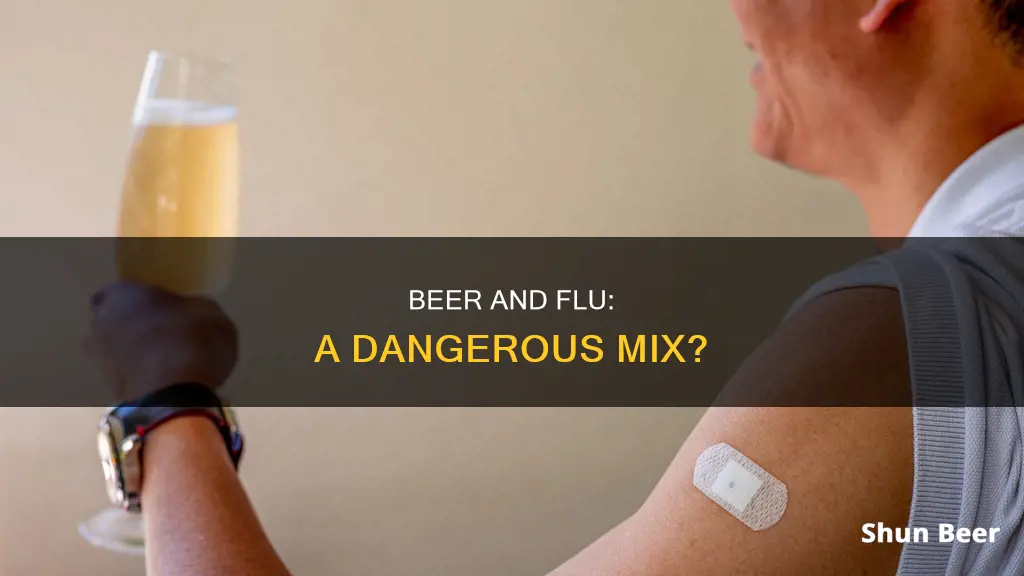
Drinking beer with the flu is generally not recommended. Alcohol can have harmful interactions with multiple ingredients found in flu medications, and can cause drowsiness, lightheadedness, and increase the risk of dangerous driving. It can also negatively impact your immune system, slow down recovery, and cause dehydration.
| Characteristics | Values |
|---|---|
| Effect on immune system | Weakens the immune system |
| Effect on liver | Can cause liver damage |
| Effect on antibiotics | Interferes with antibiotics |
| Dehydration | Increases dehydration |
| Sleep | Disrupts sleep |
| Medicine interaction | Interacts negatively with medicine |
| Hangover symptoms | Worsens hangover symptoms |
What You'll Learn

Beer and flu medication don't mix
Drinking beer when you have the flu is not recommended, especially if you are taking medication. Alcohol can negatively interact with medicines and make your symptoms worse. It can also slow down your recovery.
Here's why:
Your Immune System Needs to Focus
Alcohol can weaken your already overloaded immune system. Your body treats alcohol as a toxin and prioritises metabolising it over all other substances. This means that your body has to fight off both the sickness and the alcohol, making your recovery slower.
Your Liver Might Need a Break
Many bacterial and viral illnesses can cause abnormalities in liver functions, and so does alcohol. If you're already unwell, drinking alcohol could overburden your liver and contribute to acute or progressive liver damage.
Alcohol and Flu Medication Can Have Dangerous Interactions
Flu medication and alcohol can have some very significant interactions. Alcohol can increase the side effects of flu medication, such as dizziness, drowsiness, impaired coordination, and difficulty concentrating. It can also increase the risk of respiratory depression (slowed or stopped breathing), feelings of dissociation, brain lesions, epilepsy, or permanent psychosis.
Alcohol Increases the Risk of Dehydration
Alcohol is a diuretic, which means it increases the passing of urine at a fast rate. This can lead to dehydration, which is the last thing you want when you're feeling unwell. Dehydration can make you feel weaker and prolong your recovery.
Alcohol Won't Help You Sleep Better
While a small amount of alcohol can help you fall asleep faster, drinking more than one standard drink before bed will disrupt your deep sleep phase, also known as REM sleep. Disrupting your REM sleep can lead to feelings of anxiety and daytime drowsiness, which can make you feel worse when you're already sick.
In summary, it's best to avoid drinking beer or any other alcoholic beverage when you have the flu, especially if you're taking medication. Alcohol can negatively impact your recovery and interact dangerously with flu medication. Focus on getting plenty of rest, staying hydrated, and following your doctor's recommendations for treatment.
Non-Alcoholic Beer: Healthy or Harmful?
You may want to see also

Alcohol disrupts sleep
Research has found that alcohol significantly affects sleep quality, regardless of consumption level. A 2018 study showed that low alcohol intake reduced sleep quality by 9.3%, moderate intake by 24%, and heavy intake by nearly 40%. These effects were similar for men and women and for both active and sedentary individuals. Interestingly, alcohol affected the sleep of younger people more than older adults.
To minimise the impact of alcohol on sleep, it is recommended to allow at least three hours between your last drink and bedtime. Drinking water along with alcohol can also help flush it out of your system. It is also advisable to avoid alcohol if you are taking sleeping pills, as the combination can make it difficult to breathe during sleep, creating a dangerous situation.
Adipex and Alcohol: Is It Safe to Mix?
You may want to see also

Dehydration
Drinking beer when you have the flu can be a bad idea, and one reason is that it can cause dehydration. Alcohol is a diuretic, which means it increases the passing of urine at a fast rate. This can lead to a loss of fluids, causing dehydration. When you are sick, your body is already at an increased risk of dehydration, so drinking alcohol can worsen this problem.
In addition to its diuretic effects, beer specifically suppresses the production of the antidiuretic hormone vasopressin. This hormone helps to regulate water balance in the body, so when alcohol inhibits its production, it further contributes to dehydration.
The combination of illness and alcohol consumption can be particularly detrimental to the body's fluid levels. Illness often comes with symptoms such as fever, vomiting, and diarrhoea, which can all lead to fluid loss. When alcohol is introduced into the body during illness, it can exacerbate the fluid loss, making dehydration more severe.
To stay properly hydrated while sick, it is important to focus on consuming non-alcoholic beverages. Water, herbal tea, and other hydrating fluids are better choices than beer or other alcoholic drinks when trying to recover from the flu.
Beer and H. Pylori: What You Need to Know
You may want to see also

Weakened immune system
Drinking beer with the flu can be harmful to your health due to the negative impact of alcohol on your weakened immune system. Alcohol can overburden your immune system, slowing down your recovery.
When you are unwell, your immune system works overtime to help your body heal. Alcohol consumption adds to your body's burden, as it has to fight off both the disease and the alcohol. This results in a slower recovery. Dr. Kathy Gruver, a nutrition and stress specialist, warns that alcohol can weaken an already overloaded immune system.
The body treats alcohol as a toxin and prioritizes metabolizing it over all other substances. Even under normal circumstances, your body can only metabolize about 1oz of alcohol per hour. Consuming more alcohol than this will leave your system fighting both the illness and the alcohol, hindering your recovery process.
Alcohol also impairs immune cells in key organs, such as the lungs and gut, and damages epithelial cells, T cells, and neutrophils in the gastrointestinal (GI) system. This disruption to the composition of the gut microbiota and gut barrier function can have important implications for your overall health.
Additionally, alcohol can trigger inflammation in the gut and destroy beneficial microorganisms that maintain immune system health. According to Dr. Alex Mroszczyk-McDonald, a practicing family physician, "Alcohol intake can kill normal healthy gut bacteria, which help to promote health and reduce the risk of infection." When the body is unable to clear a pathogen effectively, an infection can worsen and lead to more severe, life-threatening complications.
In summary, drinking beer with the flu is not recommended due to the negative impact of alcohol on your weakened immune system. Alcohol can overburden your system, slow down your recovery, impair immune cells in vital organs, and disrupt the healthy composition of your gut microbiota. It is best to refrain from alcohol consumption while sick to give your body the best chance for a speedy recovery.
Drinking Beer from Mason Jars: Is It Okay?
You may want to see also

Risk of liver damage
Alcohol is a major risk factor for liver disease in general, and for liver cirrhosis in particular. Alcohol-associated liver disease is common but preventable. It is caused by heavy alcohol use, which is defined as:
> For men, consuming 5 or more drinks on any day or 15 or more drinks per week
> For women, consuming 4 or more drinks on any day or 8 or more drinks per week
The liver's job is to break down alcohol. If you drink more than it can process, it can become badly damaged. Alcohol-associated liver disease can progress through three types:
- Steatotic (fatty) liver: This is the most common alcohol-induced liver problem, caused by the buildup of fat inside liver cells, leading to an enlarged liver.
- Acute hepatitis: Alcohol-associated hepatitis is an acute inflammation of the liver, resulting in liver cell death and permanent scarring.
- Cirrhosis: Alcohol-associated cirrhosis is the destruction of normal liver tissue, leaving scar tissue in place of working liver tissue. This can cause the liver to stop working correctly.
Drinking alcohol while sick can further burden the immune system, which is already working to fight off the illness. Alcohol can also interfere with the effectiveness of antibiotics and increase the risk of dehydration, as it is a diuretic. Therefore, it is not recommended to drink beer or any other alcoholic beverage when sick, as it may slow down recovery and cause further complications such as internal bleeding, liver damage, heart and respiratory problems.
A Day's Drinking: Beer Binge and Health
You may want to see also
Frequently asked questions
Yes, it is not recommended to drink beer or any other alcoholic beverage when you are sick. Alcohol can weaken your immune system, which is already compromised when you are ill, and slow down your recovery. It can also negatively interact with medications, causing side effects such as dizziness, headaches, and vomiting.
Alcohol can burden your immune system, which is already working overtime to fight off the flu. This can lead to a slower recovery. Additionally, alcohol disrupts your gastrointestinal tract, causing gut bacteria leakage and increasing inflammation in your body.
No, it is not advisable to mix alcohol with medication. Alcohol can interact negatively with flu medications and make your symptoms worse. It may also cause serious side effects such as internal bleeding, liver damage, and heart and respiratory problems. Consult your doctor if you are unsure about the safety of combining alcohol with your medication.
Yes, instead of reaching for an alcoholic beverage, opt for hydrating options like herbal tea, seltzer, or a mocktail. Staying hydrated is crucial when you are sick, and alcohol can contribute to dehydration.







